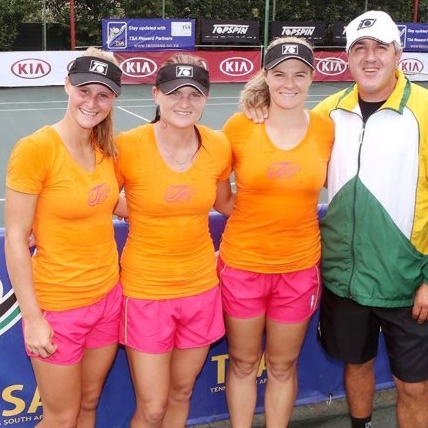
SA

Earl Grainger quits as SA Fed Cup coach
JACK MILNER
Grainger was appointed Fed Cup captain in 2014 and in 2015 he also stepped in as interim Davis Cup captain when John-Laffnie de Jager resigned in the middle of the season.
Grainger’s current term as captain finished at the end of the recent Fed Cup event in April, and, in consultation with Tennis South Africa (TSA), he decided to bring his tenure to an end.
“It was completely my decision not to continue in the role,” he said on Tuesday. “I felt that I had brought the team as far as I could. They need a new coach at the helm, not because I’m not capable to do the job, but there is a need to start making changes.”
Tennis has struggled in South Africa for a number of years and while Grainger believes there is some wonderful talent in the country, he also believes it is not being properly nurtured.
“No one is to blame for the current circumstances. What we, however, can blame is the fact that tennis does not have a major sponsor. TSA needs to make changes – and they know it. I don’t think enough money has been put into girls’ tennis.
“Richard Glover, the new CEO, is a good guy and TSA has a great vision, but it needs a big sponsor.”
He added that right now, as far as the Davis Cup team is concerned, the male tennis players are not much better off. “Once Raven Klaasen and Kevin Anderson stop playing, there is nobody waiting in the wings to take over. Lloyd Harris is a wonderful prospect, but he hasn’t made it yet.
“We have some young juniors who are very good, but are they world class?
“I just felt it was time for me to get out. I have a great tennis academy with 11 coaches, some great kids, and I want to travel with the kids I’m coaching. I’m not so young anymore. But I do have to say that TSA was superb to me. I’m well known on the local coaching scene and I have coached internationally, but I was not a big name in tennis. They gave me a great opportunity and I appreciate what they did.”
The relationship was a two-way street as Grainger did very well for the team early on, but he did have some top players of international standard, none better than Chani Scheepers. She was ranked as high as 37 in singles and 42 in doubles. She also reached the fourth round of the French Open in 2011 and the semi-finals of the Wimbledon doubles draw with Shuko Aoyama in 2013.
“With players lie Chani and Chanelle Simmons, we got promotion to the Fed Cup World Group 1, but once Chani retired it became a lot tougher because there were no new players of that level coming through. I went in with my hands tied behind my back; not that the girls were bad.
“They were great and they tried their best, but there was nothing I could do other than help them to go in with positive attitudes and with confidence.
“We have the talent, we have the coaches in but what we don’t have is exposure. That is the most important thing our players are lacking.”
Grainger said he had a number of highs and lows over the past few years. “There were two big highs. The one was when I was Davis Cup captain as well and we beat Ireland 5-0 and then there was that promotion match away in Estonia to get us into World Group 1.
“They had a strong team with players like Kaia Kanepi who was ranked No 30 in the world and Anett Kontaveit who was No 52 – and we still beat them!
“Being relegated over the next few years was obviously a low point, but being back in Group 3 is not a bad place for somebody new to start.”
Despite his decision to step down, Grainger will not be lost to tennis management. “We have formed a task force to improve certain structures in South African tennis. Among the others involved are former professional players Pietie Norval, Danie Visser and Natalie Grandin, as well as coaches Gerrie Dippenaar, Kobus Botha and Riaan Venter, while Raven (Klaasen) is also involved in an advisory capacity.”
The idea is to address the structures of tournaments, ranking systems, and then find players. “One has to set up the structures first so the players have a viable system to go into. In the past junior tournaments were judged by the quantity of entrants, rather than quality of the performances.
“TSA is trying to improve but it’s hard without a decent sponsor.”
TSA CEO Richard Glover commented: “Although we have not worked together for long, I have built up a positive relationship with Earl. He is an asset to tennis and will continue to make a strong contribution to TSA, through his ongoing involvement with our High Performance Task Force.”




